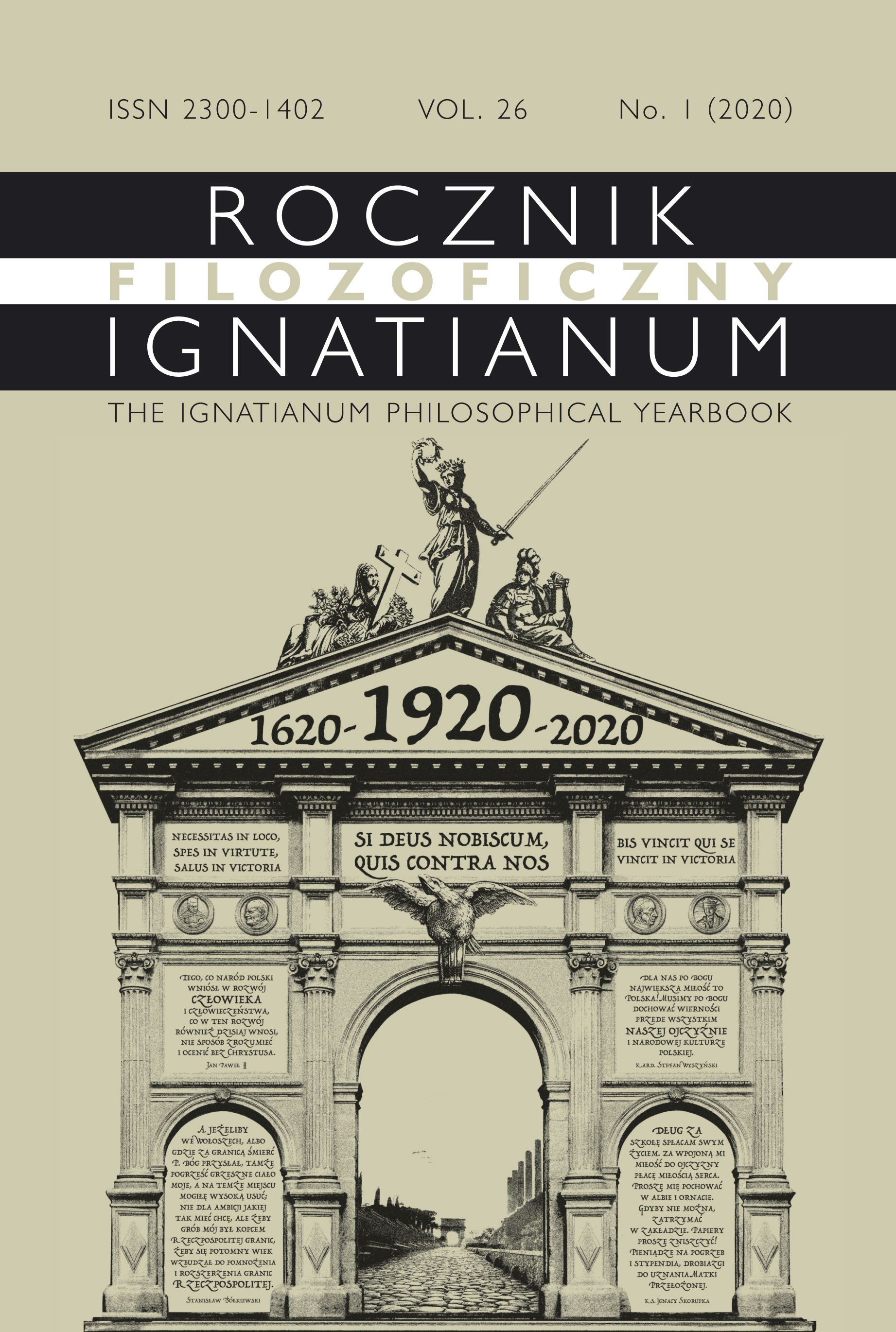Norma personalistyczna warunkiem bezpieczeństwa personalnego i świętości osoby ludzkiej
Abstract
Artykuł jest poświęcony konfrontacji dwóch sposobów spełniania się człowieka w jego doczesnej egzystencji. Od połowy tysiąclecia w kulturze europejskiej są obecne dwa główne nurty: protestancki (coraz częściej poprotestancki) i katolicki. Jednym z ich wyznaczników są dwie różne zasady, których przestrzeganie ma owo spełnianie się urzeczywistniać, odpowiednio: zasada użyteczności i norma personalistyczna. Zasada użyteczności, choć ma niewątpliwie praktyczne znaczenie, nie może być podstawą kwalifikacji moralnej ludzkiego czynu. Natomiast NP, sformułowana explicite przez Karola Wojtyłę, ale zawsze obecna w kręgu chrześcijańskim, jest fundamentem etyki katolickiej, współcześnie odniesionej do antropologii personalistycznej osoby ludzkiej. Mimo że dwudziestowieczny personalizm jest filozofią człowieka, to ma uzasadnienie teologiczne, podobnie jak antropologia św. Tomasza z Akwinu. Przywołane zasady stanowią punkt wyjścia do właściwego zadania, tj. porównania kondycji osoby ludzkiej z postulatem ochrony człowieka przed zagrożeniami, głoszonym przez nauki sekuritologiczne. W artykule wykorzystane zostały: 1) dzieła klasyki filozoficznej brytyjskiego utylitaryzmu i bardziej współczesne dotyczące jego krytyki; 2) prace rozwijające myśl personalistyczną (Jacques’a Maritaina i Karola Wojtyły); 3) prace sekuritologiczne (Mariana Cieślarczyka, Krzysztofa Drabika i Teresy Grabińskiej); 4) dokumenty Kościoła. Praca ma charakter analityczny i porównawczy. Dwa analizowane i zestawiane ze sobą rozwiązania dotyczą dwóch problemów, tj. celu i metody doskonalenia (do świętości) osoby ludzkiej oraz stanu trzech warstw bezpieczeństwa personalnego człowieka. Główna hipoteza badawcza to stwierdzenie zgodności między wysokim stopniem bezpieczeństwa personalnego (zwłaszcza jego warstwy ontyczno-kulturowej) a antropologią personalistyczną, której najogólniejszą wykładnią jest norma personalistyczna. Określa ona na poziomie ontycznym koncepcję człowieczeństwa, która rzutuje od razu na relacje międzyludzkie naznaczone miłością. Ze względu na jej uzasadnienie teologiczne, wysoki poziom bezpieczeństwa personalnego ma swój wzorzec świętości, przekraczający utylitarne ludzkie
Literaturhinweise
Arystoteles, Etyka nikomachejska, tłum. Daniela Gromska, (Warszawa: Wydaw. Nauk. PWN, 2007).
Bentham Jeremy, Wprowadzenie do zasad moralności i prawodawstwa, tłum. Bogdan Nawroczyński, (Warszawa: PWN, 1958).
Cieślarczyk Marian, „Współczesne rozumienie bezpieczeństwa”, w Bezpieczeń- stwo w badaniach i teoriach naukowych, red. Bernard Wiśniewski, (Szczytno: Wydaw. WSPol, 2011).
Drabik Krzysztof, Etyczne aspekty bezpieczeństwa w starości (Warszawa: Wydaw. AON, 2011).
Grabińska Teresa, „Bezpieczeństwo ontyczno-kulturowe transczłowieka”, w Bez- pieczeństwo kulturowe a kultura bezpieczeństwa wobec zagrożeń współczesno- ści, Teresa Grabińska, Józef Ochmann i Juliusz Piwowarski, cz. I, (Wrocław: Wydaw. AWL, 2018).
Grabińska Teresa, Bezpieczeństwo personalne. Koncepcja trzech warstw (Wroc- ław: Wydaw. AWL, 2019).
Grabińska Teresa, Etyka a bezpieczeństwo personalne (Wrocław: Wydaw. WSOWL, 2013).
Grabińska Teresa, O filozofii Karola Wojtyły i nauczaniu Jana Pawła II w kon- tekście ochrony osoby i wspólnoty, (Kraków: Wydaw. Nauk. UPJPII, 2019).
Hobbes Thomas, Lewiatan czyli Materia i forma państwa kościelnego i świeckiego, tłum. Czesław Znamierowski, (Warszawa: Fund. Aletheia, 2005).
Hołub Grzegorz, Problem osoby we współczesnych debatach bioetycznych (Kra- ków: Księgarnia Akademicka, 2010).
Francis Hutcheson, An Inquiry into the Original of Our Ideas of Beauty and Virtue, (Indianapolis IN: Liberty Fund Inc., 2008).
Jan Paweł II, Adhortacja apostolska „Christifidelis laici” (Wrocław: Wydaw. TUM, 1998).
Jan Paweł II, Encyklika „Redemptor hominis” (Wrocław: Wydaw. TUM, 1994). Kant Immanuel, Uzasadnienie metafizyki moralności, tłum. Mścisław Wartenberg, (Warszawa: PWN, 1984).
Kopania Jerzy, „Projekt udoskonalenia człowieka w świetle relacyjnej koncepcji osoby”, w Ulepszanie moralne człowieka. Perspektywa filozoficzna, red. Piotr Duchliński, Grzegorz Hołub, (Kraków: Wydaw. Nauk. AIK, 2019), 121–153. Locke John, Rozważania dotyczące rozumu ludzkiego, t. I i II, tłum. Bolesław J. Gawecki, (Warszawa: PWN, 1955).
Maritain Jacques, Dziewięć wykładów o podstawowych pojęciach filozofii moral- nej, tłum. Jarosław Merecki, (Lublin: Red. Wydawnictw KUL, 2001), 19–26. Maritain Jacques, Osoba ludzka i społeczeństwo, w idem, Pisma filozoficzne, tłum. Janina Fenrychowa, (Kraków: Społ. Instytut Wydaw. ZNAK, 1988), 327–345.
McIntyre Alasdair, Krótka historia etyki. Filozofia moralności od czasów Homera do XX wieku, tłum. Adam Chmielewski, (Warszawa: Wydaw. Nauk. PWN, 2000).
Mill John Stuart, „Utylitaryzm”, w idem, Utylitaryzm. O wolności, tłum. Maria Ossowska, (Warszawa: Wydaw. Nauk. PWN, 1995), 1–87.
Pismo Święte Starego i Nowego Testamentu, opr. Zespół Biblistów Polskich, (Poznań: Pallottinum, 1991).
Platon, „Lizys”, w Ion. Charmides. Lizys, tłum. Władysław Witwicki, (Kęty: Wydaw. ANTYK, 2002), 85–118.
Stoiński Andrzej, „Wybrane wątki krytyki utylitaryzmu”, Humanistyka i Przy- rodoznawstwo 20 (2014): 369–383.
Wojtyła Karol, Miłość i odpowiedzialność. Studium etyczne (Londyn: Katol. Ośro- dek Wydaw. „Veritas”, 1964).
Wojtyła Karol, „Osoba i czyn”, w idem, „Osoba i czyn” oraz inne studia antropo- logiczne, (Lublin: Towarzystwo Nauk. KUL, 2000), 43–344.
Zabierowski Mirosław, „Personalistyczna krytyka utylitaryzmu. Antropologicz- na analiza brytyjskiej filozofii czynu”, w Personálna obnova humanity na prahu 21. storočia, eds. Mária Klobušická i Milan Jozek, (Nitra: Wyd. Univ. K. Filozofa, 2009), 105–116.
Biesaga Tadeusz, Uzasadnienie norm moralnych w bioetyce, 27.04.2004, https:// www.mp.pl/etyka/podstawy_etyki_lekarskiej/16708,uzasadnienia-norm-moralnych-w-bioetyce (dostęp: 17.08.2020).
Konstytucja dogmatyczna o Kościele „Lumen gentium”, Dokumenty Soboru Watykańskiego II, 39-42, https://portal.tezeusz.pl/2009/01/21/konstytucja-dogmatyczna-o-kosciele-lumen-gentium/ (dostęp: 26.08.2020).
Powszechna Deklaracja Praw Człowieka, Paryż, ZO ONZ, rezolucja 217 A (III) z dnia 10 grudnia 1948 r., http://libr.sejm.gov.pl/tek01/txt/onz/1948.html (dostęp: 26.08.2020).
Copyright (c) 2021 Akademia Ignatianum w Krakowie

Dieses Werk steht unter der Lizenz Creative Commons Namensnennung 4.0 International.
Rocznik przyjmuje do druku wyłącznie materiały, które nie wchodzą w żaden konflikt interesów, żaden konflikt z prawem autorskim itp. Redakcja prowadzi działania przeciw: plagiatom, ghostwriting1, guest/honorary authorship2 itp. Autor pracy zbiorowej, który jest pierwszy na liście, bierze na siebie odpowiedzialność i ma obowiązek przedstawić wkład wszystkich współautorów. Jeśli publikacja powstała dzięki dedykowanym środkom finansowym, należy ujawnić to np. w Podziękowaniu, przypisie itp. Ew. przedruki wymagają jawnego zgłoszenia i okazania odpowiedniego pozwolenia wydawniczego. Autorzy / Recenzenci nierzetelni narażają się na reakcję właściwą stosownym instytucjom.
______
1 Ma to miejsce, gdy osoba mająca istotny wkład jest pominięta na liście Autorów czy w Podziękowaniu.
2 Zachodzi, gdy na liście autorskiej pojawia się osoba mająca znikomy/żaden udział w pracy.





